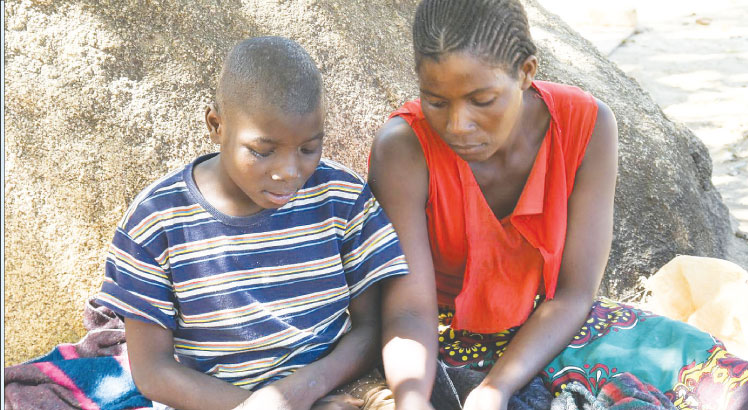Children at play run around the forecourt of Nkhulambe camp for internally displaced people in Phalombe District.
Everywhere one looks, they are confronted by poignant reminders of Cyclone Freddy which struck the Southern Region of Malawi in March this year.
There are crumbling houses, scattered debris, fallen trees and gigantic rocks on barren land and people with bandaged limbs.
Nearby, Mulanje Mountain towers over the camp. The country’s highest mountain bears the worst scars of the cyclone, with deep gullies running across and down its slopes where mudslides killed some people.
While the mountain bears physical reminders of the natural disaster, the surrounding communities walk around with physical and emotional scars coupled with constant threats to their lives.
Nkhulambe lost 60 children and seven women. In 2022, the village had 1 564 people from 289 households.
Some of the survivors of Cyclone Freddy have returned home, but 38 families still remain at the camp.
Ngalande nurses her injured son, aged 12
Women mill around the camp, sharing stories and smiles while others prepare communal meals for the day.
Behind the smiles lurks uncertainty and sadness, the hidden feelings of their incalculable loss.
A huge rock now perch where Patrick Chilamba’s house once stood. Some of the rocks that fell from from the mountain pinned him against the wall of his house, but soon rolled away, giving him room to flee for his life into the nearest mango tree where he spent the night.
His wife also escaped, but their daughter was washed away only to be discovered downstream the following day.
“She couldn’t walk for four weeks, but she has now started going to school,” Chilamba says.
Asiya Ngalande, a mother of three, has a similar tale. Her eldest child, 12, was injured and had to be airlifted weeks later to Queen Elizabeth Central Hospital in Blantyre for restorative surgery.
For those still in the camp or those that have returned home, the fear of waterborne diseases such as cholera and diarrhoea lurks.
Before the disaster, all 28 districts in Malawi were already grappling with the deadliest cholera outbreak that has killed over 1 600 from more than 55 000 patients.
The cyclone stoked fresh fears of renewed outbreaks.
Chilamba, who rented a house near his wrecked home, declares that he does not want to risk his life.
“I noticed some lapses in sanitation and hygiene at the camp, so I left,” he says.
But Dickson Bawula, a health surveillance assistant (HSA) at the devastated Nkhulambe Health Centre, reassures the community that waterborne diseases should not be their concern if they are vigilant.
“I come here almost every day and no one has shown signs of diarrhoea or cholera, which is a sign of good progress. I always advise the community, specifically those in camps, to comply with advice related to hygiene and sanitation. They need to stay safe. They have to be free from all those kinds of diseases,” he says.
Unicef, with funding from the United Nations Global Emergency Response Fund and the European Civil Protection and Humanitarian Aid Operations, donated buckets, Water Guard, plastic sheets for temporary latrine construction and soap to people affected by the cyclone.
The support targeted survivors both in camps and devastated homes.
Chilamba says the items he only received after leaving the camp gave him peace of mind.
For Ngalande and her campmates, considerable progress has been made in tackling waterborne diseases.
“We receive chlorine, which helps us prevent the possible disease outbreaks. Before we occupied the camp, it was filled with smelly mud. We used protective gear to clean it and disinfected the rooms with chlorine before we occupied them,” she explains.
Rose Tambula, treasurer of the committee overseeing the camp, expresses gratitude to health authorities and partners such as Unicef for keeping the displaced community safe.
She states: “HSAs have been helpful in providing us with chlorine. Some organisations constructed toilets for us while our men built temporary bathrooms.
“Unicef provided us with buckets in which we store chlorinated water, which is safe for us to drink. Each household was provided with a bucket, two bars of soap, and two bottles of Water Guard.”
The post Displaced community shakes off cholera fear first appeared on The Nation Online.
 Moni Malawi
Moni Malawi 
